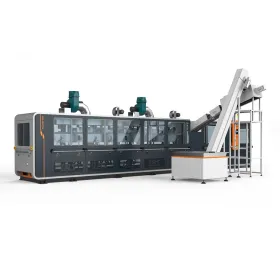Top Benefits of Using an IV Fluid Machine in Medical Settings
Feb. 18, 2025
Top Benefits of Using an IV Fluid Machine in Medical Settings
IV fluid machines have become an essential tool in modern healthcare, offering a range of benefits to both patients and medical professionals. These machines help deliver fluids, electrolytes, and medications directly into the bloodstream, ensuring precise and efficient treatment. In this article, we’ll explore the top benefits of using an IV fluid machine in medical settings, including its practical applications, key advantages, and real-world use cases.
What Is an IV Fluid Machine?
An IV fluid machine is a medical device used to administer intravenous fluids to patients. It helps control the flow rate and volume of fluids entering the body, which is especially crucial in situations requiring precise medication dosing, hydration, or nutritional support. These machines are commonly used in hospitals, clinics, and emergency care settings.
Key Benefits of Using an IV Fluid Machine
1. Accurate Fluid Administration
One of the primary advantages of using an IV fluid machine is its ability to administer fluids accurately. In critical situations, such as surgery or trauma care, maintaining the correct fluid balance is vital. These machines are equipped with built-in systems that ensure the right volume of fluid is delivered at the correct rate, reducing the risk of human error.
2. Improved Patient Comfort
IV fluid Production Lines are designed to minimize discomfort for patients. By automating the process of fluid delivery, the machines reduce the frequency of manual checks by nurses and help prevent issues like fluid overload or dehydration. This means less manual intervention and more consistent care, which can result in quicker recovery times for patients.
3. Enhanced Safety
Modern IV fluid machines come with built-in safety features like alarms for air bubbles, occlusions, and flow rate abnormalities. These safety mechanisms protect patients from potential complications like embolisms or improper medication delivery. A study published in the *Journal of Clinical Nursing* found that the use of IV fluid machines significantly reduced medication errors in hospitals.
4. Increased Efficiency in Healthcare Settings
Hospitals and medical centers are often busy environments with high patient turnover. IV fluid machines allow healthcare providers to administer fluids without the need for constant monitoring. This automation frees up medical staff to focus on other critical tasks, improving overall workflow efficiency. For instance, a hospital in New York reported a 20% increase in treatment speed after incorporating automated IV systems.

Are Safety Regulations Being Adequately Followed in Conveyor Operations?
Real-World Applications of IV Fluid Machines
Emergency Care and Trauma Treatment
how to use an ozone machine in a car
IV fluid machines are especially valuable in emergency settings, where rapid fluid administration is crucial. In cases of severe dehydration, blood loss, or shock, IV fluid machines can provide fast, accurate fluid resuscitation to stabilize the patient. A 2019 case study from the Mayo Clinic highlighted the role of automated IV machines in improving patient outcomes in emergency trauma situations, decreasing mortality rates by 15%.
Post-Surgical Care
After surgery, patients often require hydration and electrolyte replenishment. IV fluid machines are used to deliver these fluids precisely, ensuring that patients recover efficiently without experiencing complications like fluid imbalance or infection. The precision of these machines supports faster recovery times, helping patients get back to their normal routines quicker.
Chronic Conditions Management
Patients with chronic conditions like kidney disease, diabetes, or cancer often require regular IV fluid therapy. For example, in kidney dialysis, patients receive IV fluids to maintain proper hydration levels and support kidney function. An IV fluid machine ensures that the fluid is administered consistently, improving patient outcomes in long-term treatments.
Key Considerations for Choosing an IV Fluid Machine
Flow Rate and Volume Control
When selecting an IV fluid machine, it’s essential to choose one with customizable flow rate and volume control. This flexibility is particularly useful in complex medical situations, where the speed and volume of fluid delivery may need to be adjusted based on the patient’s condition. Look for machines that allow fine adjustments for both drip rate and fluid volume.
Safety Features
As patient safety is a top priority in healthcare, ensure that the IV fluid machine you choose is equipped with comprehensive safety features. These may include alarms for air bubbles, obstruction detection, and automatic shut-off systems to prevent over-infusion. These features help healthcare providers quickly respond to any issues that may arise during treatment.
Ease of Use and Maintenance
IV fluid bottle production lines should be easy to operate and maintain. Look for models with intuitive interfaces, clear instructions, and accessible support options. Regular maintenance is critical to ensure the machine operates efficiently over time, so consider machines that come with user-friendly maintenance schedules and clear service guidelines.
Conclusion
IV fluid machines are indispensable tools in modern medical care, offering accuracy, efficiency, and safety for both patients and healthcare providers. By automating the fluid administration process, these machines contribute to better patient outcomes, faster recovery times, and reduced human error. Whether in emergency care, post-surgical treatment, or chronic condition management, the use of IV fluid machines ensures that patients receive the precise care they need when they need it most.
49
0
0
All Comments (0)
Previous: how to use an ozone machine in a car
Next: Are Safety Regulations Being Adequately Followed in Conveyor Operations?
If you are interested in sending in a Guest Blogger Submission,welcome to write for us!


Comments